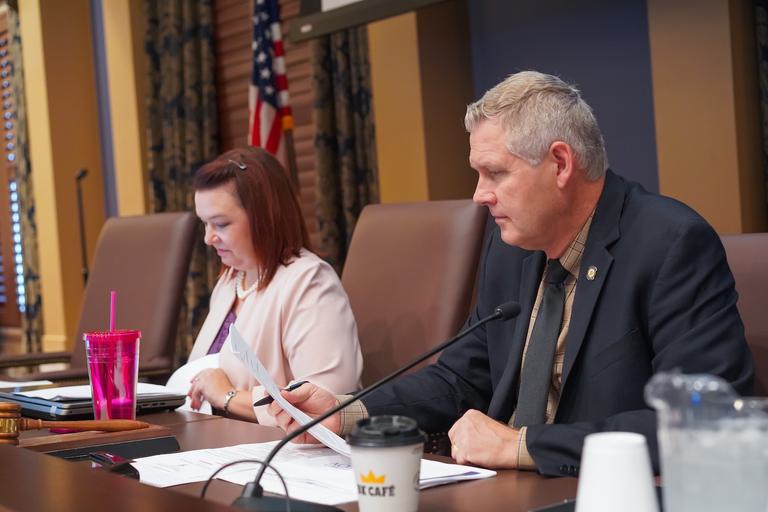
Education
Ray Carter | September 10, 2019
HB 1017 reforms included school-choice funding
Ray Carter
The passage of House Bill 1017 in 1990 has long been hailed as a major step forward for Oklahoma education. One often overlooked component of that reform measure is that the law allowed the use of taxpayer funding to cover private-school costs for certain students, lawmakers were reminded Tuesday.
Carolyn Thompson, chief of government affairs for the Oklahoma State Department of Education, noted that HB 1017 created a special-education assistance fund “to help districts educate students with significant disabilities which result in extraordinary costs, including out-of-home placement and residential facilities.”
“We do have districts that send kids to Arkansas and Kansas,” Thompson said. “There are some facilities, and the district is responsible for bearing the weight of the cost of that placement, or providing whatever services that student might need.”
The law applies to students covered by the federal Individuals with Disabilities Education Act. The special-education assistance fund has apparently received cash from direct legislation appropriations through the years, Thompson said, and does not currently contain any money.
Thompson’s comments were made before members of the Senate Education Committee, which met Tuesday to review HB 1017’s mandates and impact.
While HB 1017 provided increased school-choice opportunities via taxpayer funding to some students with special needs, Thompson noted the law was very restrictive and much power was in the hands of school district officials serving on a child’s Individualized Education Program (IEP) team.
“It has to be an agreement of the IEP team,” Thompson said. “So if a parent on their own, outside of the school setting, decides their child needs x services, then the parent is responsible for that.”
But if the IEP team at the school agrees the district cannot provide needed services, “then the school is responsible to pay for that,” Thompson said.
Some lawmakers appeared concerned that those restrictions create perverse incentives for districts to deny educational services to needy children.
“Do you see that as a potential barrier for individuals making the best decisions for students because it is very costly and not currently funded?” asked Sen. Carri Hicks, D-Oklahoma City, a former teacher.
“I think most districts are trying to do what’s best for their kids and most IEP teams are trying to do what’s best,” Thompson said, “but it is a significant cost.”
Two decades after HB 1017’s passage, Oklahoma lawmakers built on the success of its school-choice provision by creating the Lindsey Nicole Henry Scholarships for Students with Disabilities Act. Under the Henry scholarship program, parents can receive much of the per-pupil allotment that would otherwise be spent on their child and use it for private-school tuition. The program is available to students with special needs who are on an IEP in public school in accordance with the federal Individuals with Disabilities Education Act.
When the Lindsey Nicole Henry Scholarships law was challenged in court, the Oklahoma Supreme Court upheld its constitutionality, noting it differs little from the longstanding law that allows schools to use taxpayer funds to send students to private schools.
“Oklahoma public school districts are required to provide education and related services to all children with disabilities,” a unanimous court ruled in 2016 (emphasis in original, statutory citations omitted). “Following a statute amendment in 1993, each school district has had the option to provide these services or delegate this responsibility and enter into a written agreement with a private institution to provide the mandated services. Thus, for more than twenty years, each school district has had the statutory authority to decide whether it would provide this education or enter into a contract with a private institution to provide the required educational needs to students with disabilities. When the Lindsey Nicole Henry Scholarship Act was enacted in 2010, the legislature simply allowed parents and legal guardians the same right that school districts already enjoyed, the choice to use state funds to contract with an approved private institution for special education services.”

Ray Carter
Director, Center for Independent Journalism
Ray Carter is the director of OCPA’s Center for Independent Journalism. He has two decades of experience in journalism and communications. He previously served as senior Capitol reporter for The Journal Record, media director for the Oklahoma House of Representatives, and chief editorial writer at The Oklahoman. As a reporter for The Journal Record, Carter received 12 Carl Rogan Awards in four years—including awards for investigative reporting, general news reporting, feature writing, spot news reporting, business reporting, and sports reporting. While at The Oklahoman, he was the recipient of several awards, including first place in the editorial writing category of the Associated Press/Oklahoma News Executives Carl Rogan Memorial News Excellence Competition for an editorial on the history of racism in the Oklahoma legislature.